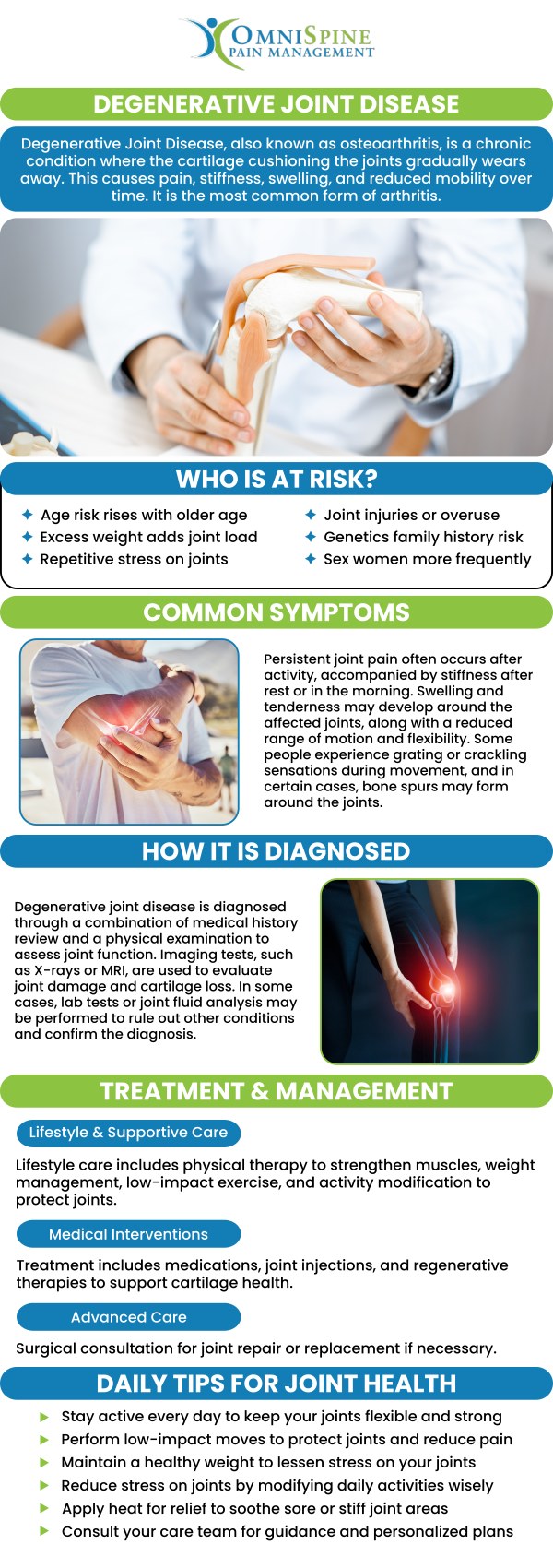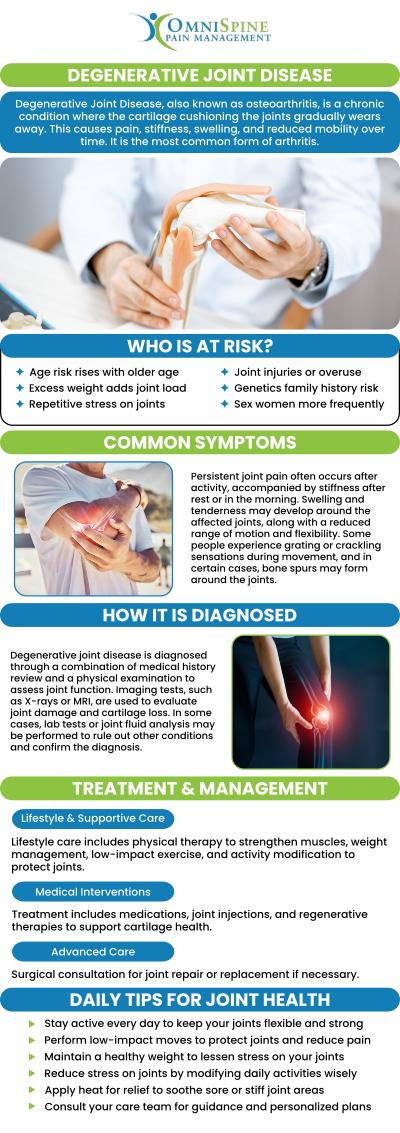Degenerative Joint Disease Treatment Q&A
Degenerative joint disease can be treated individually to reduce pain, increase mobility, and improve your quality of life. Dr. Andrew Morchower, MD, MPH, offers cutting-edge care to keep you pain-free and active. For more information, contact us or book an appointment online. Our clinics are located in Frisco TX, Sunnyvale, TX, and Mesquite, TX.




Table of Contents:
What is Degenerative Joint Disease (DJD)?
What causes Degenerative Joint Disease?
What are the symptoms of DJD?
How is Degenerative Joint Disease diagnosed?
At OmniSpine Pain Management, we understand the impact Degenerative Joint Disease (DJD), or osteoarthritis, can have on your life. As a chronic condition characterized by the gradual deterioration of cartilage in the joints, DJD can lead to significant pain, stiffness, and reduced mobility. Our focus is on providing comprehensive care tailored to managing your symptoms and improving your quality of life.
DJD is the most common form of arthritis and is often associated with aging due to the cumulative wear and tear on joints. However, factors such as obesity, previous joint injuries, genetics, and repetitive motion from certain activities can also contribute to its development. The condition most commonly affects the knee, hips, spine, neck, hands, and feet.
Symptoms to Watch For:
• Persistent joint pain, especially after physical activity
• Morning stiffness or stiffness after inactivity
• Swelling and tenderness around joints
• Decreased range of motion
• Grating or crackling sensations during movement
• Potential development of bone spurs
We provide lifestyle guidance, including weight management and exercise plans, to reduce joint stress and improve overall health. Our physical therapy programs focus on strengthening muscles and enhancing joint flexibility. Tailored medication management and injection therapies, such as corticosteroids and hyaluronic acid, offer targeted pain relief. For severe cases, we collaborate with orthopedic specialists to explore advanced surgical options like joint repair or replacement.
We recognize that Degenerative Joint Disease, commonly known as osteoarthritis, is a significant concern for many of our patients. Pain, stiffness, swelling, and decreased range of motion are the main symptoms of this degenerative disorder that affects the joints and is caused by the slow deterioration of cartilage.
We provide age-appropriate interventions to maintain joint health and slow cartilage breakdown. Our weight management programs help reduce stress on weight-bearing joints, minimizing the risk of further degeneration. For those with prior joint injuries, we focus on rehabilitation and prevention strategies to restore function. Patients engaged in repetitive activities receive guidance on movement modifications and joint protection techniques. Additionally, we offer genetic counseling and personalized monitoring for individuals with a family history of osteoarthritis.
OmniSpine Pain Management provides advanced treatments for osteoarthritis by addressing its root causes. Dr. Andrew Morchower, MD, MPH, uses regenerative therapies like PRP to support cartilage repair and reduce degeneration. Minimally invasive joint injections help relieve pain from bone-on-bone contact. Anti-inflammatory treatments and lifestyle changes manage inflammation and swelling effectively. For severe cases, surgical options are available to remove bone spurs and restore mobility.
We work with specialists to manage metabolic disorders like diabetes, addressing related inflammation. For post-menopausal women, we explore hormone therapy options to influence disease progression. Our physiotherapy programs focus on strengthening muscles to support joints and reduce stress.
Understanding these causes and risk factors allows us to provide tailored care plans that aim to manage and potentially slow the progression of Degenerative Joint Disease, ensuring our patients achieve optimal joint health and quality of life.
1. Pain Management:
Pain is the hallmark symptom of DJD. At OmniSpine Pain Management, we offer a range of treatments tailored to alleviate pain, including medication management, minimally invasive procedures, and regenerative therapies. Our goal is to reduce your pain and improve your daily function.
2. Addressing Stiffness:
Morning stiffness or stiffness after inactivity is a common challenge. Our team provides personalized physical therapy and exercise programs designed to enhance joint flexibility and reduce stiffness, helping you maintain an active lifestyle.
3. Improving Range of Motion:
Limited joint mobility can affect daily activities. Through targeted interventions such as joint injections and guided stretching exercises, we aim to restore your range of motion and support your active participation in everyday tasks.
4. Reducing Swelling and Warmth:
We use anti-inflammatory medications and advanced therapeutic techniques to manage joint swelling and warmth, reducing inflammation and discomfort around the affected areas.
5. Managing Crepitus:
While crepitus, or the grating sensation in joints, can be unsettling, our specialists provide reassurance and strategies to manage it effectively, focusing on joint protection and strengthening surrounding muscles.
6. Enhancing Joint Stability:
Joint instability and muscle weakness can lead to falls and further joint damage. Our multi-disciplinary team develops strength-building programs and stability exercises to fortify the muscles and ligaments around your joints.
7. Combating Fatigue:
Chronic pain can be exhausting. Our holistic approach includes lifestyle modifications, nutritional counseling, and stress management techniques to help combat fatigue and improve your overall energy levels.
At OmniSpine Pain Management, we prioritize an accurate and comprehensive diagnosis of Degenerative Joint Disease (DJD), also known as osteoarthritis, to ensure our patients receive the most effective treatment plan. Our multidisciplinary approach combines clinical evaluations, state-of-the-art imaging studies, and advanced diagnostic tests to assess joint health and rule out other potential causes of symptoms.
Clinical Evaluation:
Our diagnostic process starts with a detailed review of your medical history, focusing on symptoms like joint pain, stiffness, and past injuries to identify patterns of degeneration. We then perform a thorough physical examination, assessing swelling, tenderness, range of motion, joint stability, and crepitus. This helps pinpoint the affected joints and determine the severity of your condition. Together, these steps provide a comprehensive understanding for accurate diagnosis and treatment planning.
Imaging Studies:
X-rays: As a standard imaging method, X-rays are utilized to detect joint space narrowing, bone spurs, and other structural changes characteristic of DJD.
Magnetic Resonance Imaging (MRI): When X-ray results are inconclusive or to further assess soft tissue involvement, MRI provides a detailed view of the joint’s cartilage, ligaments, and synovium.
Computed Tomography (CT) Scan: CT scans offer cross-sectional images to reveal detailed bone and cartilage abnormalities, aiding in a more comprehensive evaluation.
Other Diagnostic Tests:
Blood Tests: We may conduct blood tests, such as erythrocyte sedimentation rate (ESR) and C-reactive protein (CRP), to exclude other conditions with similar symptoms, like rheumatoid arthritis or gout. These tests help assess inflammation levels and support our diagnostic process.
Joint Fluid Analysis: Arthrocentesis is performed when necessary to collect and analyze joint fluid. This helps us differentiate DJD from inflammatory arthritis by identifying signs of inflammation or infection.
Our thorough diagnostic workup is crucial in distinguishing DJD from other joint conditions with overlapping symptoms. Conditions we differentiate from include:
• Rheumatoid arthritis
• Gout
• Lupus
• Carpal tunnel syndrome
Take control of your joint health with expert care from Dr. Andrew Morchower, MD, MPH, at OmniSpine Pain Management. Our advanced treatments for degenerative joint disease are designed to reduce pain, enhance mobility, and improve your overall quality of life. Whether you’re dealing with stiffness or limited movement, we provide personalized solutions to keep you active and comfortable. For more information, contact us or book an appointment online. Our clinics are located in Frisco TX, Sunnyvale TX, and Mesquite, TX. We serve patients from Dallas TX, Frisco TX, Mesquite TX, Sunnyvale TX, Plano TX, Garland TX, Forney TX, Cedar Hill TX, Denton TX, Balch Springs TX, and surrounding areas.
Check Out Our 5 Star Reviews






